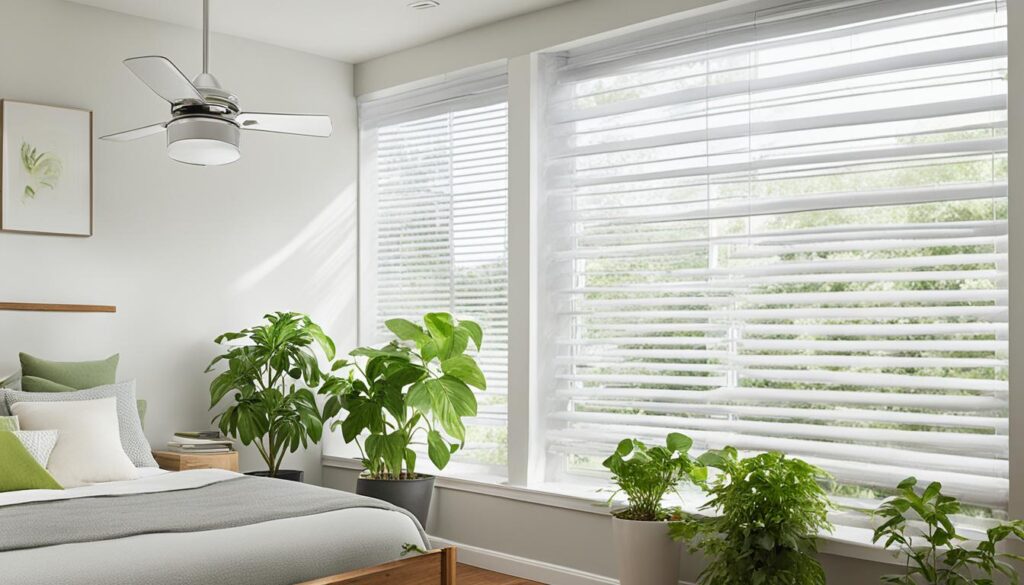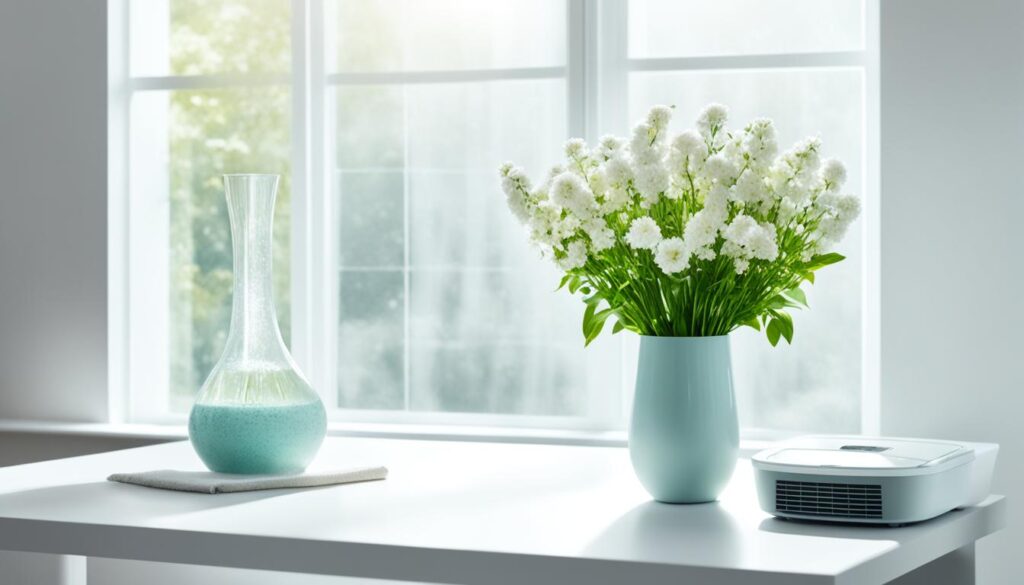
Musty Room Smell Solutions, No Mold Detected
Are you experiencing a lingering musty odor in your room even though there is no visible mold present? Don’t worry, you’re not alone. Musty smells in rooms without mold can be caused by various factors, and finding effective solutions to eliminate the odor is crucial in creating a fresh and inviting space.
In this article, we will explore practical tips and techniques to help you get rid of the musty smell in your room, even when there is no mold detected. From identifying the source of the odor to implementing proper ventilation, cleaning techniques, and controlling humidity levels, we’ve got you covered.
So, if you’re tired of the unpleasant musty scent in your room, continue reading to discover effective strategies for eliminating the odor and creating a pleasant and odor-free environment.
Key Takeaways:
- Musty smells can occur in rooms without visible mold, but there are solutions to eliminate the odor.
- Identifying the source of the musty smell is crucial in order to address the issue effectively.
- Proper ventilation and air circulation play a significant role in getting rid of musty odors.
- Cleaning and deodorizing techniques can help remove the musty smell from your room.
- Checking for hidden mold is important, as it can be the cause of the musty scent even without visible signs.
Identifying the Source of the Musty Smell
Before addressing the musty smell in your room, it is crucial to identify the source of the odor. Even without visible mold, there could be various factors contributing to the musty scent. By pinpointing the origin, you can effectively eliminate the unpleasant odor and create a fresh environment.
Common Causes of Musty Odors in Rooms without Visible Mold
- Poor ventilation: Insufficient airflow can lead to stagnant air, trapping moisture and causing a musty smell.
- Humidity: Excess humidity in the room can create the perfect breeding ground for mold and mildew, resulting in musty odors.
- Dampness: Moisture from leaks, condensation, or high humidity levels can penetrate walls, carpets, or furniture, promoting the growth of mold and causing a musty smell.
- Poor cleaning habits: Neglecting regular cleaning, especially in hidden or hard-to-reach areas, can lead to the accumulation of dust, dirt, and organic matter, which can cause musty odors.
- Decaying matter: Organic materials such as food, plants, or even dead insects can decompose and emit a musty smell.
Pinpointing the Origin of the Musty Smell
To identify the source of the musty smell, start by thoroughly inspecting the room:
- Check for visible signs of mold, such as discoloration, water stains, or fuzzy growth. Remember that mold can appear in various colors, not just black.
- Sniff around different areas of the room, paying attention to corners, closets, carpets, and upholstery, as these are common hotspots for musty smells.
- Investigate any hidden sources of moisture, such as leaks or water damage behind walls, under flooring, or in the ceiling.
- Examine the air conditioning or HVAC system, as mold or mildew in the ductwork can distribute musty odors throughout the room.
By using these investigative techniques, you can narrow down the potential sources of the musty smell and take targeted steps to eliminate it.
Ventilation and Air Circulation
Proper ventilation and air circulation are essential in eliminating the musty smell in your room. By improving airflow, you can create a fresh environment that is free from unpleasant odors.
To effectively eliminate the musty smell, consider implementing the following strategies:
- Open windows and doors: Regularly opening windows and doors can facilitate air exchange, allowing fresh air to enter and stale air to leave the room. This simple action can go a long way in reducing odors.
- Use exhaust fans: Utilize exhaust fans in areas prone to moisture, such as bathrooms and kitchens. These fans help remove humid air and prevent the growth of mold and mildew, which are common sources of musty odors.
- Invest in a dehumidifier: If your room experiences high humidity levels, consider using a dehumidifier. These devices extract excess moisture from the air, helping to eliminate musty smells and reducing the risk of mold growth.
- Clean air vents and ducts: Regularly clean and maintain your air vents and ducts to ensure efficient airflow. Dust, debris, and mold spores can accumulate in these areas and contribute to the musty odor in your room.
In addition to these strategies, it’s important to keep your room well-organized and clutter-free. Clutter can obstruct airflow and create stagnant areas where musty smells tend to linger.
“Proper ventilation and air circulation are crucial in eliminating musty odors. Implementing strategies such as opening windows, using exhaust fans, and investing in a dehumidifier can significantly improve the airflow in your room and create a fresh environment.”
By following these ventilation and air circulation techniques, you can effectively remove the musty smell and create a more pleasant living space.

Now that we’ve explored the importance of ventilation and air circulation in eliminating musty odors, let’s move on to cleaning and deodorizing techniques. In the next section, we will discuss effective methods to remove the musty smell from your room and create a fresh and inviting atmosphere.
Cleaning and Deodorizing Techniques
When dealing with a musty smell in your room, thorough cleaning and deodorizing techniques are essential for eliminating the odor. By following these step-by-step instructions and using the right products, you can effectively remove the musty smell and create a fresh and inviting environment.
- Remove and wash fabrics: Start by taking out any curtains, linens, or rugs that may be contributing to the musty smell. Launder them with a mild detergent and allow them to air dry completely.
- Clean surfaces: Next, clean all surfaces in the room, including walls, ceilings, and floors. Use a mild cleaning solution and a microfiber cloth or sponge to thoroughly wipe down each surface.
- Focus on problem areas: Pay close attention to areas that are prone to moisture, such as bathrooms, basements, or areas near windows. These areas may require extra cleaning and deodorizing to get rid of the musty smell.
- Address mold or mildew: It’s important to note that even if there is no visible mold, there may still be hidden mold contributing to the odor. If you suspect mold or mildew growth, consult a professional for proper remediation.
- Use odor-neutralizing products: To effectively remove the musty smell, consider using odor-neutralizing products such as activated charcoal, baking soda, or specialized odor absorbers. Place these products in strategic areas of the room to absorb odors over time.
- Improve ventilation: Proper ventilation is crucial for eliminating musty smells. Open windows, use fans, or consider investing in a dehumidifier to improve airflow and reduce excess moisture.
- Consider professional help: If the musty smell persists despite your efforts, it may be beneficial to seek professional assistance. Mold remediation experts can assess the situation and provide specialized treatments to eliminate the odor.
By following these cleaning and deodorizing techniques, you can successfully eliminate musty smells from your room and create a fresh and pleasant living space. Remember, prevention is key, so taking steps to control moisture levels and improve ventilation can help prevent future musty odors.
Checking for Hidden Mold
Even if there is no visible mold, it is crucial to check for hidden mold when dealing with a musty smell in your room. Hidden mold can be the underlying cause of the unpleasant odor and may require further attention. In this section, we will discuss effective methods to detect hidden mold and provide guidance on what to do if mold is found.
When checking for hidden mold, it’s important to thorough
Controlling Humidity Levels
Excessive humidity can contribute to musty odors in a room, even without visible mold growth. To eliminate the musty smell and create a fresher environment, it is important to control the humidity levels. Here are some effective ways to achieve this:
1. Use a Dehumidifier
Invest in a reliable dehumidifier to remove excess moisture from the air. Place it in the room with the musty smell and set it to maintain a humidity level between 30% and 50%. This will help prevent the growth of mold and mildew, which are often responsible for the musty odor.
2. Improve Ventilation
Poor ventilation can trap moisture and contribute to musty smells. Open windows regularly to allow fresh air to circulate and remove stagnant air. Consider installing exhaust fans or air vents in areas prone to higher humidity, such as bathrooms and kitchens.
3. Monitor Humidity Levels
Use a hygrometer to monitor the humidity levels in your room. This device measures the amount of moisture in the air and helps you identify when humidity is too high. If the reading consistently exceeds 50%, take action to reduce humidity and prevent the development of musty odors.
4. Fix Leaks and Water Intrusion
Water leaks and intrusions can lead to increased humidity levels and musty smells. Inspect your room for any signs of leaks, such as damp walls or ceilings. Address the source of the problem promptly and consult a professional if necessary to prevent further damage and eliminate the musty odor.
Tip: Keep your room well ventilated and maintain optimal humidity levels to eliminate musty smells and create a fresh environment.
By implementing these strategies to control humidity levels, you can effectively eliminate the musty smell in your room, even without visible mold growth. Remember, maintaining a dry and well-ventilated space is key to preventing musty odors from returning.

Odor Absorbing Solutions
Are you struggling with a musty smell in your room but can’t find any visible mold? Don’t worry, we’ve got you covered. In this section, we’ll explore effective odor-absorbing solutions that will help eliminate the musty smell in your room, even when there is no mold present.
Natural Remedies
If you prefer natural solutions, there are several options that can help neutralize the musty odor. One popular method is using baking soda. Simply place a few bowls of baking soda around the room and leave them overnight. Baking soda is known for its ability to absorb and neutralize odors. You can also add a few drops of essential oils, such as lavender or lemon, to create a pleasant aroma.
Air Purifiers
An air purifier is another effective way to eliminate musty smells from your room. These devices work by filtering the air and removing pollutants, including odor-causing particles. Look for an air purifier with a HEPA filter, as it is designed to capture even the smallest particles. Place the purifier in the room and let it run for a few hours to notice a significant improvement in the air quality and the elimination of the musty odor.
Other Products
In addition to natural remedies and air purifiers, there are various other products available in the market specifically designed to eliminate odors. Odor-absorbing sprays, gels, and fresheners can provide quick relief from musty smells. Make sure to read the instructions and choose a product that is safe to use in enclosed spaces.
Remember, finding the right odor-absorbing solution may require some trial and error. What works for one person may not work for another, so feel free to experiment with different methods until you find the one that best suits your needs.
| Odor Absorbing Solutions | Effectiveness | Price Range |
|---|---|---|
| Natural Remedies (Baking Soda) | High | Low |
| Air Purifiers | Very High | High |
| Odor-Absorbing Products | Medium | Varies |
As you can see from the table above, natural remedies like baking soda are not only effective at absorbing odors but also budget-friendly. Air purifiers, on the other hand, provide a high level of effectiveness but come with a higher price tag. Ultimately, the choice will depend on your needs and budget.
Now that you know about odor-absorbing solutions, it’s time to put them into action. Say goodbye to that musty smell and enjoy a fresh and pleasant-smelling room.
Preventing Musty Odors in the Future
After successfully eliminating the musty smell in your room, it is important to take preventive measures to ensure it does not return. Follow these practical tips and strategies to maintain a fresh and odor-free room in the long term:
- Keep the room clean and dry: Regularly clean and dust all surfaces, including carpets, furniture, and curtains. Be sure to address any spills or moisture promptly to prevent the growth of mold or mildew that can lead to musty odors.
- Improve ventilation: Proper ventilation is essential for reducing excess humidity and preventing the accumulation of musty smells. Open windows or use fans to improve airflow and encourage fresh air circulation in the room.
- Monitor humidity levels: Use a hygrometer to keep track of the humidity in your room. Ideally, the humidity should be maintained between 30% and 50%. Consider using a dehumidifier in areas with high humidity to prevent mold growth and musty odors.
- Avoid dampness: Take precautions to prevent water leaks or condensation in your room. Inspect pipes, faucets, and windows regularly for any signs of moisture. Repair leaks or address any sources of dampness promptly to prevent musty smells from developing.
- Use moisture absorbers: Place moisture-absorbing products, such as desiccants or silica gel packets, in areas prone to moisture buildup, like closets or cabinets. These products help to absorb excess moisture and prevent musty odors.
- Regularly check for mold: Despite the absence of visible mold, it is important to periodically inspect your room for any signs of mold growth. Pay attention to areas susceptible to moisture, such as bathrooms or basements. If mold is detected, take immediate steps to address it and prevent further growth.
- Avoid storing damp items: Do not store wet or damp items in your room, as they can contribute to musty odors over time. Ensure that belongings are completely dry before storing them to prevent moisture buildup and the development of musty smells.
- Consider using natural odor absorbers: Place natural odor-absorbing materials, such as activated charcoal or baking soda, in your room to help neutralize any potential odors. These substances effectively absorb and eliminate musty smells.
By implementing these preventive measures, you can maintain a fresh and odor-free room, free from the unpleasant musty smells. Remember to regularly assess and address any potential sources of moisture to prevent the growth of mold and mildew. With proper care and maintenance, you can enjoy a clean and inviting environment.
Fix Mold Miami is Florida’s Highest Rated In Mold Assessments, Prevention and Remediation. Contact Fix Mold Miami at 305-465-6653 for a mold assessment.
Conclusion
In conclusion, even if there is no visible mold, it is possible to eliminate musty smells in your room. By following the tips and techniques discussed in this article, you can create a pleasant and inviting environment free from unpleasant odors.
Proper ventilation and air circulation are vital for combating musty smells. Improve the airflow in your room by opening windows, using fans, or installing an air purifier to keep the air fresh and circulating.
Cleaning and deodorizing techniques are also effective in eliminating musty smells. Use appropriate cleaning products and follow step-by-step instructions to remove any lingering odors. Additionally, check for hidden mold using proper inspection methods and take necessary measures if mold is found.
To prevent future musty odors, control humidity levels in your room. Use dehumidifiers or manage moisture sources to inhibit the growth of mold and mildew, which are common causes of musty smells.
Remember, if you’re experiencing persistent musty smells or suspect mold growth, it’s crucial to seek professional assistance. Contact Fix Mold Miami at 305-465-6653 for a mold assessment and comprehensive remediation services.




